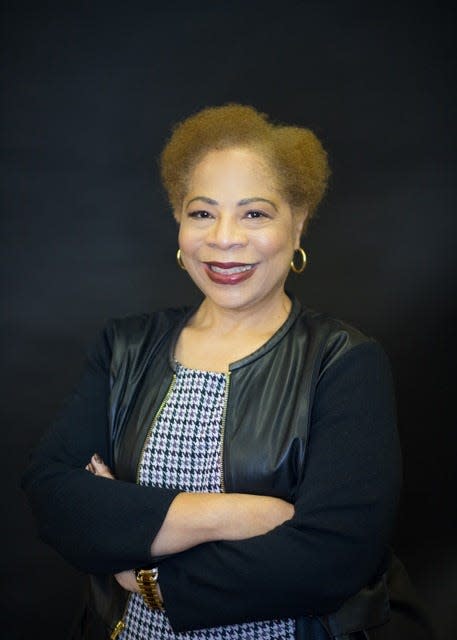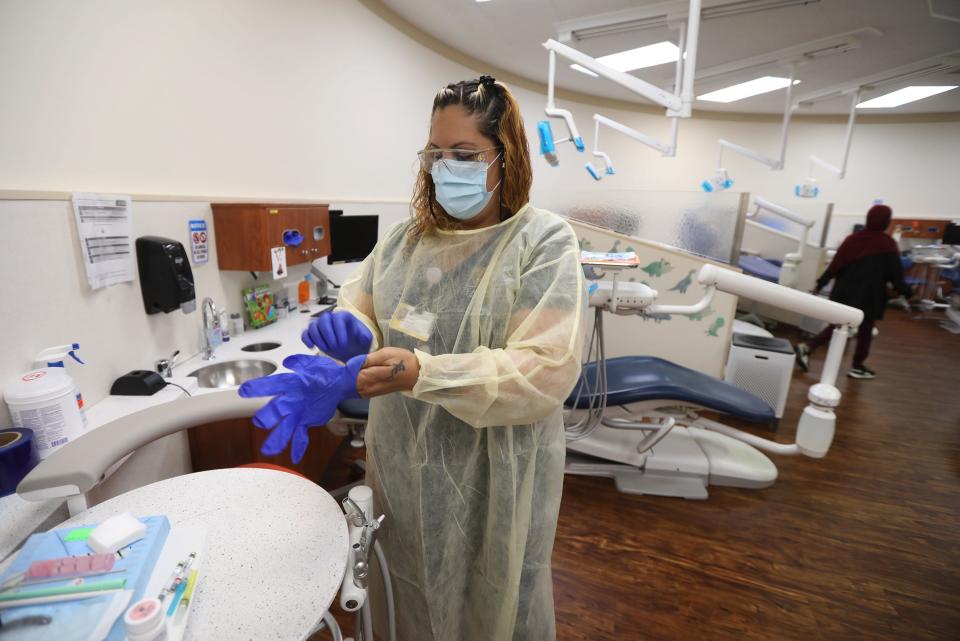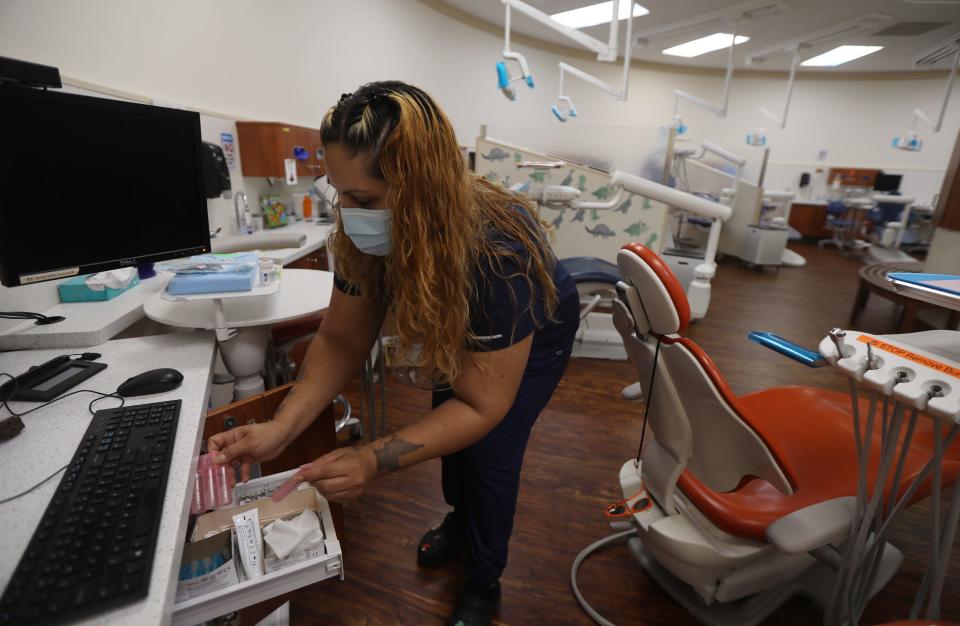'You just keep going': Rochester's anti-poverty initiative resets ambitious mission
What is the difference between $12.75 an hour and $19 an hour?
For Carmen Franco, it was a house. With the raise she got as a dental assistant at the University of Rochester Medical Center's Eastman Dental, she was able to afford a down payment on a small house in southwest Rochester.
She could afford to paint the whole inside the exact colors she wanted and to put in a shed for all her tools. Before she'd only used them to repair other people's property; now she could do it for her own.
"I've been fixing other people's houses as a renter," she said. "I wanted my own house so I could do it how I wanted. So it feels really good."
There are many people in Rochester hoping to get that same lift from economic vulnerability to relative comfort. It is with that possibility in mind that the Rochester Monroe County Anti-Poverty Initiative, a coalition now in its ninth year, has adopted a new approach.
Gone is a single-minded fixation on lifting people above the federal poverty line, Executive Director Aqua Porter said,. Instead the new Unity Agenda focuses on what she called "true upward mobility" that transcends simple economics.

"Getting a dollar above that poverty limit doesn’t reduce the experience of people who are truly having poverty as an experience," Porter said in a recent interview at the RMAPI office near Village Gate. "There are so many other things going on that we have to change to uplift people."
The poverty rate in the city in 2013 was 33%. The most recent federal data, from 2021, shows the rate at 28%. Both numbers place Rochester among the poorest mid-sized cities in the United States.
A few of the nagging items on RMAPI's fix-it list: housing, education, transportation, criminal justice and health care.
"I don't want to be Pollyannish about it," Porter said. "It is huge; it is everything. ...
I'm about to participate on the Upward Mobility panel. Let's go #LiveAtUrban pic.twitter.com/JIbWh8viZE
— Waterlady (@PorterAqua) July 19, 2023
"But it's like being a parent. If you stop for a moment and think how hard it is, you'd probably just give up. But you just keep going. Because what choice do you have?"
Moon launch, but for poverty
The poverty-fighting coalition in the Rochester was never meant to be called RMAPI. That was just an unwieldy acronym for a working group title that somehow stuck.
RMAPI leaders -- before Porter came Leonard Brock -- have spent a great deal of energy over the last nine years attempting to clarify misperceptions and bad first impressions of that sort, dating to its founding in 2015.
First of all, it is a coalition of entities with their own funding and programs, not an autonomous organization of its own. The annual RMAPI budget is about $1 million, Porter said, with most of it going to personnel costs for the small paid staff.

Similarly, Porter said, the bombast with which the creation of the coalition was first announced has proven counterproductive.
"I feel like (President John) Kennedy announcing we’re going to the moon, and they didn’t have anything built,” Joe Morelle, then the state Assembly majority leader and now a congressman, said at the launch. "This is real. ... It's a fundamental shift in how this community addresses poverty."
From 2017: Internal documents reveal early challenges for Rochester anti-poverty initiative
In particular, Porter said, it was unrealistic to aim for a 50% reduction in the poverty rate in 15 years.
"We framed it in a way early on where we implied to the community that these huge, huge goals were possible in a fairly short amount of time," she said. "There's no silver bullet to this."
As early as 2019, Brock was walking back the initial goal of a 50% poverty reduction and instead redirecting attention to progress on the guiding principles of community building and anti-racism. The new Unity Agenda is another step in that direction.
'Easier to function'
RMAPI partners have undertaken a wide array of initiatives since 2015, with varying degrees of success. One they believed worked was a push for local employers to increase their minimum wage to at least $15 an hour before that became the state law.
By their estimates, more 110 employers gave raises to more than 10,000 employees in 2020 and 2021, bringing them over the $15 an hour limit.
Carmen Franco was one of the beneficiaries. In 2020 she was working as a cleaner earning $12.75. She first got to $15 an hour working as a porter and then was offered a role as a dental aide, adding another dollar.
"It allowed me to put clothes on my kids’ backs and food on the table," she said. "It allows you to buy yourself a car to get to work on time, to go to your appointments, to not depend on anyone to go do groceries or wait at the grocery store for a taxi to come pick you up with all your bags."
As important, she said, was the mental strain that was lifted once she had the assurance of some savings in the bank.
"When you see the check’s not enough and you’re just getting by day-by-day or week-by-week with the little bit you’re getting, and you’re hoping with the next check there’s a little bit left so you can take your kids out to the movies or get some lunch – it’s hard," she said. "It’s hard not to be able to do for your kids the way you’d like to."

Nancy Rivas-Sanchez, a medical assistant at URMC's Red Creek location, got a boost from $14.25 an hour and now is above $17 an hour. Now she's trying to qualify for URMC's tuition-free nursing program.
"When I saw my first paycheck, it was a big difference," she said. "You’re able to function better. .... Mortgage, rent, car insurance, everything is going up, and so the pay increase is a big help to pay for all that."
Now RMAPI partners hope to expand on that $15-an-hour push by extending the same challenge to benefits or expanded career pathways, among other things. There is also a specific focus on the employment gap for Black men.
Opportunity is knocking at the Gantt Recreation Center. @RochesterWorks and RMAPI teamed up this PM for a unique job fair, connecting our residents exclusively with Level Up Champions- business that pay a higher starting wage. pic.twitter.com/tR6cy9LnnM
— Dave Seeley (@daveseeley430) October 27, 2022
"I think we know the problem, and now it’s looking at solutions," said Dave Seeley, executive director of RochesterWorks and co-chair of RMAPI's employment working group. "RMAPI’s success has been in bringing the community together around a broad agenda. Just that focus and concentration is helpful."
Efforts not in vain
RMAPI's Unity Agenda identifies three preconditions to upward mobility: economic success; dignity and belonging; and power and autonomy.
Those manifest in a wide-ranging set of 2023 priorities, including improving child care subsidies, expanding access to mental health care and using code enforcement mechanisms to improve the quality of rental housing.
Porter specifically mentioned a number of ongoing initiatives in housing as well as the city's small-scale experiment with guaranteed basic income.
Those efforts are largely being led by what she called "the usual suspects" -- governmental entities as well as large non-profits like the United Way, Action for a Better Community and the Ibero-American Action League.
"We need to expand the coalition," Porter said. "We really need to get the private sector and the faith community on board."
It is likely that by 2030 there still will be tens of thousands of Rochesterians living in poverty, just as there are now and there were eight years ago. But Porter said that would not mean RMAPI's efforts were in vain.
"We're not not working," she said. "It's just a lot of work."
Justin Murphy is a veteran reporter at the Democrat and Chronicle and author of "Your Children Are Very Greatly in Danger: School Segregation in Rochester, New York." Follow him on Twitter at twitter.com/CitizenMurphy or contact him at jmurphy7@gannett.com.
This article originally appeared on Rochester Democrat and Chronicle: RMAPI Unity Agenda aims for upward mobility in Rochester amid poverty

